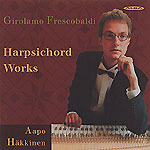Frescobaldi’s contemporaries found his eccentric personality and progressive keyboard oeuvre perplexing, and today’s listeners tend to either love or hate his music, regardless of the fact that he arguably was the most influential keyboard composer during the second half of the 17th century. Here harpsichordist Aapo Hakkinen offers a generous program of Frescobaldi’s works that, with the exception of the Cento Partite sopra Passacagli and the wild Capriccio sopra la Battaglia, focus on the composer’s lighter, less avant-garde side.
Compared to Vartolo, who in his complete Frescobaldi keyboard cycle (Tactus) often adopts precariously slow tempos that heighten the quirky drama of the composer’s frequent thematic about-faces, Hakkinen’s less edgy lyrical approach equally satisfies. Hakkinen’s performances of the Balletto Terzo e Corrente de Balletto, Capriccio di Durezze, and Recercar Quinto are rendered with such inordinate refinement and delicacy that they sound more stylistically akin to some of the composer’s English contemporaries, such as William Byrd or Thomas Tomkins.
Hakkinen’s lucid rendering of the previously mentioned Cento Partite sopra Passacagli, with its frequent harrowing runs and thematic recapitulations, also is impressive, though his performance of the Capriccio sopra la Battaglia lacks the overall programmatic allure Vartolo routinely achieves. Here Hakkinen’s break-neck tempos (he completes the piece in 2:30 compared to Vartolo’s 3:28) undermines the action, particularly in the equestrian charge sequences. Horses simply can’t run that fast!
Alba’s sound is exceptionally clear and detailed. In the notes Hakkinen offers a few paragraphs about his instrument, though strangely not one word about Frescobaldi or the program (there is a brief bio of Frescobaldi however, in Finnish only). Reprinted instead is a 1994 five-page essay titled The Modern Sound of Early Music by Richard Taruskin(!) questioning the hyperbole, if not the legitimacy of the period-instrument movement. Okay, fine–although anecdotes about the composer’s very colorful life would have been more welcome than the author’s “echt-Teutonic” musings on Mengelberg, Nikisch, Muck, and Furtwängler, or the account of Taruskin’s encounter with Roger Norrington in San Francisco. Recommended nonetheless.
































